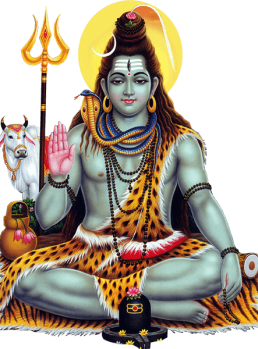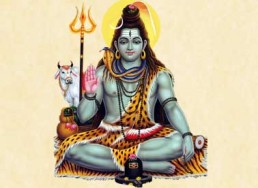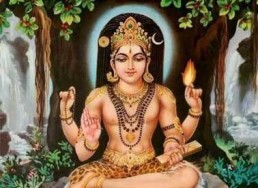Shiva Mahimna Stotram
स्तुतिर्ब्रह्मादीनामपि तदवसन्नास्त्वयि गिरः ।
अथाऽवाच्यः सर्वः स्वमतिपरिणामावधि गृणन्
ममाप्येष स्तोत्रे हर निरपवादः परिकरः ॥ १॥
stutirbrahmādīnāmapi tadavasannāstvayi giraḥ .
athā’vācyaḥ sarvaḥ svamatipariṇāmāvadhi gṛṇan
mamāpyeṣa stotre hara nirapavādaḥ parikaraḥ .. 1..
अतद्व्यावृत्त्या यं चकितमभिधत्ते श्रुतिरपि ।
स कस्य स्तोतव्यः कतिविधगुणः कस्य विषयः
पदे त्वर्वाचीने पतति न मनः कस्य न वचः ॥ २॥
atadvyāvṛttyā yaṃ cakitamabhidhatte śrutirapi .
sa kasya stotavyaḥ katividhaguṇaḥ kasya viṣayaḥ
pade tvarvācīne patati na manaḥ kasya na vacaḥ .. 2..
तव ब्रह्मन् किं वागपि सुरगुरोर्विस्मयपदम् ।
मम त्वेतां वाणीं गुणकथनपुण्येन भवतः
पुनामीत्यर्थेऽस्मिन् पुरमथन बुद्धिर्व्यवसिता ॥ ३॥
tava brahman kiṃ vāgapi suragurorvismayapadam .
mama tvetāṃ vāṇīṃ guṇakathanapuṇyena bhavataḥ
punāmītyarthe’smin puramathana buddhirvyavasitā .. 3..
त्रयीवस्तु व्यस्तं तिस्रुषु गुणभिन्नासु तनुषु ।
अभव्यानामस्मिन् वरद रमणीयामरमणीं
विहन्तुं व्याक्रोशीं विदधत इहैके जडधियः ॥ ४॥
trayīvastu vyastaṃ tisruṣu guṇabhinnāsu tanuṣu .
abhavyānāmasmin varada ramaṇīyāmaramaṇīṃ
vihantuṃ vyākrośīṃ vidadhata ihaike jaḍadhiyaḥ .. 4..
किमाधारो धाता सृजति किमुपादान इति च ।
अतर्क्यैश्वर्ये त्वय्यनवसर दुःस्थो हतधियः
कुतर्कोऽयं कांश्चित् मुखरयति मोहाय जगतः ॥ ५॥
kimādhāro dhātā sṛjati kimupādāna iti ca .
atarkyaiśvarye tvayyanavasara duḥstho hatadhiyaḥ
kutarko’yaṃ kāṃścit mukharayati mohāya jagataḥ .. 5..
अधिष्ठातारं किं भवविधिरनादृत्य भवति ।
अनीशो वा कुर्याद् भुवनजनने कः परिकरो
यतो मन्दास्त्वां प्रत्यमरवर संशेरत इमे ॥ ६॥
adhiṣṭhātāraṃ kiṃ bhavavidhiranādṛtya bhavati .
anīśo vā kuryād bhuvanajanane kaḥ parikaro
yato mandāstvāṃ pratyamaravara saṃśerata ime .. 6..
प्रभिन्ने प्रस्थाने परमिदमदः पथ्यमिति च ।
रुचीनां वैचित्र्यादृजुकुटिल नानापथजुषां
नृणामेको गम्यस्त्वमसि पयसामर्णव इव ॥ ७॥
prabhinne prasthāne paramidamadaḥ pathyamiti ca .
rucīnāṃ vaicitryādṛjukuṭila nānāpathajuṣāṃ
nṛṇāmeko gamyastvamasi payasāmarṇava iva .. 7..
कपालं चेतीयत्तव वरद तन्त्रोपकरणम् ।
सुरास्तां तामृद्धिं दधति तु भवद्भूप्रणिहितां
न हि स्वात्मारामं विषयमृगतृष्णा भ्रमयति ॥ ८॥
kapālaṃ cetīyattava varada tantropakaraṇam .
surāstāṃ tāmṛddhiṃ dadhati tu bhavadbhūpraṇihitāṃ
na hi svātmārāmaṃ viṣayamṛgatṛṣṇā bhramayati .. 8..
परो ध्रौव्याऽध्रौव्ये जगति गदति व्यस्तविषये ।
समस्तेऽप्येतस्मिन् पुरमथन तैर्विस्मित इव
स्तुवन् जिह्रेमि त्वां न खलु ननु धृष्टा मुखरता ॥ ९॥
paro dhrauvyā’dhrauvye jagati gadati vyastaviṣaye .
samaste’pyetasmin puramathana tairvismita iva
stuvan jihremi tvāṃ na khalu nanu dhṛṣṭā mukharatā .. 9..
परिच्छेतुं यातावनिलमनलस्कन्धवपुषः ।
ततो भक्तिश्रद्धा-भरगुरु-गृणद्भ्यां गिरिश यत्
स्वयं तस्थे ताभ्यां तव किमनुवृत्तिर्न फलति ॥ १०॥
paricchetuṃ yātāvanilamanalaskandhavapuṣaḥ .
tato bhaktiśraddhā-bharaguru-gṛṇadbhyāṃ giriśa yat
svayaṃ tasthe tābhyāṃ tava kimanuvṛttirna phalati .. 10..
दशास्यो यद्बाहूनभृत-रणकण्डू-परवशान् ।
शिरःपद्मश्रेणी-रचितचरणाम्भोरुह-बलेः
स्थिरायास्त्वद्भक्तेस्त्रिपुरहर विस्फूर्जितमिदम् ॥ ११॥
daśāsyo yadbāhūnabhṛta-raṇakaṇḍū-paravaśān .
śiraḥpadmaśreṇī-racitacaraṇāmbhoruha-baleḥ
sthirāyāstvadbhaktestripurahara visphūrjitamidam .. 11..
बलात् कैलासेऽपि त्वदधिवसतौ विक्रमयतः ।
अलभ्यापातालेऽप्यलसचलितांगुष्ठशिरसि
प्रतिष्ठा त्वय्यासीद् ध्रुवमुपचितो मुह्यति खलः ॥ १२॥
balāt kailāse’pi tvadadhivasatau vikramayataḥ .
alabhyāpātāle’pyalasacalitāṃguṣṭhaśirasi
pratiṣṭhā tvayyāsīd dhruvamupacito muhyati khalaḥ .. 12..
अधश्चक्रे बाणः परिजनविधेयत्रिभुवनः ।
न तच्चित्रं तस्मिन् वरिवसितरि त्वच्चरणयोः
न कस्याप्युन्नत्यै भवति शिरसस्त्वय्यवनतिः ॥ १३॥
adhaścakre bāṇaḥ parijanavidheyatribhuvanaḥ .
na taccitraṃ tasmin varivasitari tvaccaraṇayoḥ
na kasyāpyunnatyai bhavati śirasastvayyavanatiḥ .. 13..
विधेयस्याऽऽसीद् यस्त्रिनयन विषं संहृतवतः ।
स कल्माषः कण्ठे तव न कुरुते न श्रियमहो
विकारोऽपि श्लाघ्यो भुवन-भय- भङ्ग- व्यसनिनः ॥ १४॥
vidheyasyā”sīd yastrinayana viṣaṃ saṃhṛtavataḥ .
sa kalmāṣaḥ kaṇṭhe tava na kurute na śriyamaho
vikāro’pi ślāghyo bhuvana-bhaya- bhaṅga- vyasaninaḥ .. 14..
निवर्तन्ते नित्यं जगति जयिनो यस्य विशिखाः ।
स पश्यन्नीश त्वामितरसुरसाधारणमभूत्
स्मरः स्मर्तव्यात्मा न हि वशिषु पथ्यः परिभवः ॥ १५॥
nivartante nityaṃ jagati jayino yasya viśikhāḥ .
sa paśyannīśa tvāmitarasurasādhāraṇamabhūt
smaraḥ smartavyātmā na hi vaśiṣu pathyaḥ paribhavaḥ .. 15..
पदं विष्णोर्भ्राम्यद् भुज-परिघ-रुग्ण-ग्रह- गणम् ।
मुहुर्द्यौर्दौस्थ्यं यात्यनिभृत-जटा-ताडित-तटा
जगद्रक्षायै त्वं नटसि ननु वामैव विभुता ॥ १६॥
padaṃ viṣṇorbhrāmyad bhuja-parigha-rugṇa-graha- gaṇam .
muhurdyaurdausthyaṃ yātyanibhṛta-jaṭā-tāḍita-taṭā
jagadrakṣāyai tvaṃ naṭasi nanu vāmaiva vibhutā .. 16..
प्रवाहो वारां यः पृषतलघुदृष्टः शिरसि ते ।
जगद्द्वीपाकारं जलधिवलयं तेन कृतमिति
अनेनैवोन्नेयं धृतमहिम दिव्यं तव वपुः ॥ १७॥
pravāho vārāṃ yaḥ pṛṣatalaghudṛṣṭaḥ śirasi te .
jagaddvīpākāraṃ jaladhivalayaṃ tena kṛtamiti
anenaivonneyaṃ dhṛtamahima divyaṃ tava vapuḥ .. 17..
रथाङ्गे चन्द्रार्कौ रथ-चरण-पाणिः शर इति ।
दिधक्षोस्ते कोऽयं त्रिपुरतृणमाडम्बर विधिः
विधेयैः क्रीडन्त्यो न खलु परतन्त्राः प्रभुधियः ॥ १८॥
rathāṅge candrārkau ratha-caraṇa-pāṇiḥ śara iti .
didhakṣoste ko’yaṃ tripuratṛṇamāḍambara vidhiḥ
vidheyaiḥ krīḍantyo na khalu paratantrāḥ prabhudhiyaḥ .. 18..
यदेकोने तस्मिन् निजमुदहरन्नेत्रकमलम् ।
गतो भक्त्युद्रेकः परिणतिमसौ चक्रवपुषः
त्रयाणां रक्षायै त्रिपुरहर जागर्ति जगताम् ॥ १९॥
yadekone tasmin nijamudaharannetrakamalam .
gato bhaktyudrekaḥ pariṇatimasau cakravapuṣaḥ
trayāṇāṃ rakṣāyai tripurahara jāgarti jagatām .. 19..
क्व कर्म प्रध्वस्तं फलति पुरुषाराधनमृते ।
अतस्त्वां सम्प्रेक्ष्य क्रतुषु फलदान-प्रतिभुवं
श्रुतौ श्रद्धां बध्वा दृढपरिकरः कर्मसु जनः ॥ २०॥
kva karma pradhvastaṃ phalati puruṣārādhanamṛte .
atastvāṃ samprekṣya kratuṣu phaladāna-pratibhuvaṃ
śrutau śraddhāṃ badhvā dṛḍhaparikaraḥ karmasu janaḥ .. 20..
ऋषीणामार्त्विज्यं शरणद सदस्याः सुर-गणाः ।
क्रतुभ्रंशस्त्वत्तः क्रतुफल-विधान-व्यसनिनः
ध्रुवं कर्तुं श्रद्धा विधुरमभिचाराय हि मखाः ॥ २१॥
ṛṣīṇāmārtvijyaṃ śaraṇada sadasyāḥ sura-gaṇāḥ .
kratubhraṃśastvattaḥ kratuphala-vidhāna-vyasaninaḥ
dhruvaṃ kartuṃ śraddhā vidhuramabhicārāya hi makhāḥ .. 21..
गतं रोहिद् भूतां रिरमयिषुमृष्यस्य वपुषा ।
धनुष्पाणेर्यातं दिवमपि सपत्राकृतममुं
त्रसन्तं तेऽद्यापि त्यजति न मृगव्याधरभसः ॥ २२॥
gataṃ rohid bhūtāṃ riramayiṣumṛṣyasya vapuṣā .
dhanuṣpāṇeryātaṃ divamapi sapatrākṛtamamuṃ
trasantaṃ te’dyāpi tyajati na mṛgavyādharabhasaḥ .. 22..
पुरः प्लुष्टं दृष्ट्वा पुरमथन पुष्पायुधमपि ।
यदि स्त्रैणं देवी यमनिरत-देहार्ध-घटनात्
अवैति त्वामद्धा बत वरद मुग्धा युवतयः ॥ २३॥
puraḥ pluṣṭaṃ dṛṣṭvā puramathana puṣpāyudhamapi .
yadi straiṇaṃ devī yamanirata-dehārdha-ghaṭanāt
avaiti tvāmaddhā bata varada mugdhā yuvatayaḥ .. 23..
चिता-भस्मालेपः स्रगपि नृकरोटी-परिकरः ।
अमङ्गल्यं शीलं तव भवतु नामैवमखिलं
तथापि स्मर्तॄणां वरद परमं मङ्गलमसि ॥ २४॥
citā-bhasmālepaḥ sragapi nṛkaroṭī-parikaraḥ .
amaṅgalyaṃ śīlaṃ tava bhavatu nāmaivamakhilaṃ
tathāpi smartṝṇāṃ varada paramaṃ maṅgalamasi .. 24..
प्रहृष्यद्रोमाणः प्रमद-सलिलोत्सङ्गति-दृशः ।
यदालोक्याह्लादं ह्रद इव निमज्यामृतमये
दधत्यन्तस्तत्त्वं किमपि यमिनस्तत् किल भवान् ॥ २५॥
prahṛṣyadromāṇaḥ pramada-salilotsaṅgati-dṛśaḥ .
yadālokyāhlādaṃ hrada iva nimajyāmṛtamaye
dadhatyantastattvaṃ kimapi yaminastat kila bhavān .. 25..
त्वमापस्त्वं व्योम त्वमु धरणिरात्मा त्वमिति च ।
परिच्छिन्नामेवं त्वयि परिणता बिभ्रति गिरं
न विद्मस्तत्तत्त्वं वयमिह तु यत् त्वं न भवसि ॥ २६॥
tvamāpastvaṃ vyoma tvamu dharaṇirātmā tvamiti ca .
paricchinnāmevaṃ tvayi pariṇatā bibhrati giraṃ
na vidmastattattvaṃ vayamiha tu yat tvaṃ na bhavasi .. 26..
अकाराद्यैर्वर्णैस्त्रिभिरभिदधत् तीर्णविकृति ।
तुरीयं ते धाम ध्वनिभिरवरुन्धानमणुभिः
समस्त-व्यस्तं त्वां शरणद गृणात्योमिति पदम् ॥ २७॥
akārādyairvarṇaistribhirabhidadhat tīrṇavikṛti .
turīyaṃ te dhāma dhvanibhiravarundhānamaṇubhiḥ
samasta-vyastaṃ tvāṃ śaraṇada gṛṇātyomiti padam .. 27..
तथा भीमेशानाविति यदभिधानाष्टकमिदम् ।
अमुष्मिन् प्रत्येकं प्रविचरति देव श्रुतिरपि
प्रियायास्मैधाम्ने प्रणिहित-नमस्योऽस्मि भवते ॥ २८॥
tathā bhīmeśānāviti yadabhidhānāṣṭakamidam .
amuṣmin pratyekaṃ pravicarati deva śrutirapi
priyāyāsmaidhāmne praṇihita-namasyo’smi bhavate .. 28..
नमः क्षोदिष्ठाय स्मरहर महिष्ठाय च नमः ।
नमो वर्षिष्ठाय त्रिनयन यविष्ठाय च नमः
नमः सर्वस्मै ते तदिदमतिसर्वाय च नमः ॥ २९॥
namaḥ kṣodiṣṭhāya smarahara mahiṣṭhāya ca namaḥ .
namo varṣiṣṭhāya trinayana yaviṣṭhāya ca namaḥ
namaḥ sarvasmai te tadidamatisarvāya ca namaḥ .. 29..
प्रबल-तमसे तत् संहारे हराय नमो नमः ।
जन-सुखकृते सत्त्वोद्रिक्तौ मृडाय नमो नमः
प्रमहसि पदे निस्त्रैगुण्ये शिवाय नमो नमः ॥ ३०॥
prabala-tamase tat saṃhāre harāya namo namaḥ .
jana-sukhakṛte sattvodriktau mṛḍāya namo namaḥ
pramahasi pade nistraiguṇye śivāya namo namaḥ .. 30..
क्व च तव गुण-सीमोल्लङ्घिनी शश्वदृद्धिः ।
इति चकितममन्दीकृत्य मां भक्तिराधाद्
वरद चरणयोस्ते वाक्य-पुष्पोपहारम् ॥ ३१॥
kva ca tava guṇa-sīmollaṅghinī śaśvadṛddhiḥ .
iti cakitamamandīkṛtya māṃ bhaktirādhād
varada caraṇayoste vākya-puṣpopahāram .. 31..
सुर-तरुवर-शाखा लेखनी पत्रमुर्वी ।
लिखति यदि गृहीत्वा शारदा सर्वकालं
तदपि तव गुणानामीश पारं न याति ॥ ३२॥
sura-taruvara-śākhā lekhanī patramurvī .
likhati yadi gṛhītvā śāradā sarvakālaṃ
tadapi tava guṇānāmīśa pāraṃ na yāti .. 32..
ग्रथित-गुणमहिम्नो निर्गुणस्येश्वरस्य ।
सकल-गण-वरिष्ठः पुष्पदन्ताभिधानः
रुचिरमलघुवृत्तैः स्तोत्रमेतच्चकार ॥ ३३॥
grathita-guṇamahimno nirguṇasyeśvarasya .
sakala-gaṇa-variṣṭhaḥ puṣpadantābhidhānaḥ
ruciramalaghuvṛttaiḥ stotrametaccakāra .. 33..
पठति परमभक्त्या शुद्ध-चित्तः पुमान् यः ।
स भवति शिवलोके रुद्रतुल्यस्तथाऽत्र
प्रचुरतर-धनायुः पुत्रवान् कीर्तिमांश्च ॥ ३४॥
paṭhati paramabhaktyā śuddha-cittaḥ pumān yaḥ .
sa bhavati śivaloke rudratulyastathā’tra
pracuratara-dhanāyuḥ putravān kīrtimāṃśca .. 34..
अघोरान्नापरो मन्त्रो नास्ति तत्त्वं गुरोः परम् ॥ ३५॥
aghorānnāparo mantro nāsti tattvaṃ guroḥ param .. 35..
महिम्नस्तव पाठस्य कलां नार्हन्ति षोडशीम् ॥ ३६॥
mahimnastava pāṭhasya kalāṃ nārhanti ṣoḍaśīm .. 36..
शशिधरवर-मौलेर्देवदेवस्य दासः ।
स खलु निज-महिम्नो भ्रष्ट एवास्य रोषात्
स्तवनमिदमकार्षीद् दिव्य-दिव्यं महिम्नः ॥ ३७॥
śaśidharavara-maulerdevadevasya dāsaḥ .
sa khalu nija-mahimno bhraṣṭa evāsya roṣāt
stavanamidamakārṣīd divya-divyaṃ mahimnaḥ .. 37..
पठति यदि मनुष्यः प्राञ्जलिर्नान्य-चेताः ।
व्रजति शिव-समीपं किन्नरैः स्तूयमानः
स्तवनमिदममोघं पुष्पदन्तप्रणीतम् ॥ ३८॥
paṭhati yadi manuṣyaḥ prāñjalirnānya-cetāḥ .
vrajati śiva-samīpaṃ kinnaraiḥ stūyamānaḥ
stavanamidamamoghaṃ puṣpadantapraṇītam .. 38..
अनौपम्यं मनोहारि सर्वमीश्वरवर्णनम् ॥ ३९॥
anaupamyaṃ manohāri sarvamīśvaravarṇanam .. 39..
अर्पिता तेन देवेशः प्रीयतां मे सदाशिवः ॥ ४०॥
arpitā tena deveśaḥ prīyatāṃ me sadāśivaḥ .. 40..
यादृशोऽसि महादेव तादृशाय नमो नमः ॥ ४१॥
yādṛśo’si mahādeva tādṛśāya namo namaḥ .. 41..
सर्वपाप-विनिर्मुक्तः शिव लोके महीयते ॥ ४२॥
sarvapāpa-vinirmuktaḥ śiva loke mahīyate .. 42..
स्तोत्रेण किल्बिष-हरेण हर-प्रियेण ।
कण्ठस्थितेन पठितेन समाहितेन
सुप्रीणितो भवति भूतपतिर्महेशः ॥ ४३॥
इति श्री पुष्पदन्त विरचितं शिवमहिम्नः स्तोत्रं समाप्तम् ॥
stotreṇa kilbiṣa-hareṇa hara-priyeṇa .
kaṇṭhasthitena paṭhitena samāhitena
suprīṇito bhavati bhūtapatirmaheśaḥ .. 43..
iti śrī puṣpadanta viracitaṃ śivamahimnaḥ stotraṃ sampurnam ..

Description
A king named Chitraratha had constructed a nice garden. There were beautiful flowers in this garden. These flowers were used every day by the king in worshipping Lord Shiva. One day a Gandharva (Singer in the court of Indra, the Lord of the Heaven) named Pushpadanta being fascinated by the beautiful flowers, began to steal them, as a consequence of which king Chitraratha could not offer flowers to Lord Shiva. He tried very hard to capture the thief, but in vain, because the Gandharvas have divine power to remain invisible. Finally the king spread the Shiva Nirmalya in his garden. Shiva Nirmalya consists of the Bilva leaves, flowers, etc. which have been used in worshipping Lord Shiva. The Shiva Nirmalya is considered holy. The thief Pushpadanta, not knowing this, walked on the Shiva Nirmalya, and by that he incurred the wrath of Lord Shiva and lost the divine power of invisibility. He then designed a prayer to Lord Shiva for forgiveness. In this prayer he sung the greatness of the Lord. This very prayer became well known as the `Shiva Mahimna Stotra’. Lord Shiva became pleased by this Stotram, and returned Pushpadanta’s divine powers. The legend has some basis since the name of the author is mentioned in verse number 38 of the stotram.
The recital of this stotra is very beneficial, and Shri Ramakrishna Paramahamsa, a great saint of the nineteenth century, would go into samadhi just by reciting a few verses from this hymn. May its recitation be beneficial to you as well!
Other Shiva Shlokams
Anayasena Maranam
O Lord Shiva, please grant me a peaceful death without pain (Anasayena Maranam), a life without any trouble or dependence on others for my basic needs (Vina Dhainyena Jeevanam) and a life filled with
Ardha Narishvara Stotram
Shri Ardhanareeshwara Stotram was composed by Sri Adi Shankara bhagavatpada. Creator and Creation are One ~ Ardhanarishwara, composite of Shiva and Shakti together in one body.
Bilvashtakam
Composed by Sri Adi Shankaracharya, the famous Bilvashtakam extols the virtues of the Bilva leaf (also spelt Vilva, Bilwa) and Lord Shiva’s love for it. The following com
Bilvashtakam 14 Verses
Note: For the original version of Bilvashtakam please click here. Composed by Sri Adi Shankaracharya,
Chandrashekhara Ashtakam
Chandrashekhara Ashtakam is a divine hymn to praise God Shiva as Chandrasekhara, the lord who is adorned with moon on his head (Chandra – moon, Sekhar – crown) and to seek refuge from untimely death.
Dakshinamurthy Stotram
Shlokams,Sankara,Shiva,Dakshinamurthy
The Dakshinamurti Stotra is a Sanskrit religious hymn to Shiva by Sri Adi Shankaracharya. It explains the metaphysics of the universe in the frame of the tradition of Advaita V
Ishvaro Guru Atmeti
Shlokams,Shiva,Dakshinamurthy,Guru,Sankara
Salutations to Lord Dakshinamurti, who is all-pervasive like space but who appears (as though) divided as Lord, Guru, and the Self.
Kalabhairava Ashtakam
Composed by Sri Adi Shankaracharya. The hymn illustrates the personality of Kala Bhairava of Kashi, the God of Death(kala). Those who study these 8 verses on Kala Bhairava, which are enticing and whic
Karacharana Kritam
O Lord, kindly forgive all the wrong acts and omissions I have committed, whether I committed them knowingly or unknowingly, with my hands, feet, words, ears, eyes, or mind. Glory to you, Mahadeva, wh
Karpura Gauram
Pure white like camphor, an incarnation of compassion, the essence of worldly existence, whose garland is the king of serpents, always dwelling inside the lotus of the heart. I bow to Shiva and Shakti together
Kasi Viswanathashtakam
Composed by Sri Adi Sankaracharya in praise of Lord Shiva. That man who reads this octet with its meaning, which sings the praise of Shiva who is the lord of Varanasi, would get knowledge, wealth, gre
Lingashtakam
The Lingashtakam is one of the most popular Ashtakams(a Stotram with 8 verses) dedicated to Lord Shiva which praises Him in the abstract "Lingam" form.
Margabandhu Stotram
This great Stotra Rathna was written by Appayya Deekshitha(1520-1593). He was one of the great interpreter of Advaitha Sidhantha after Adi Sankara. This stotra is written in praise of the Lord Margaba
Mauna Vyakhya
Shlokams,Sankara,Shiva,Dakshinamurthy
I salute Sri Dakshinamurti, who is not subject to time, who makes known the truth of Brahman through the implied meaning of words, who is surrounded by disciples who are themselves Rishis and committe
Mruthyunjayaya Rudraya
Salutation to you Mrithyunjaya, Rudra, Nilakanta, Shambhu & the lord of immortals and this great lord of all beings.
Namaste astu bhagavan
Morning prayer. From Devi Mahatmyam. The Devi Mahatmyam is a Hindu religious text describing the Goddess as the supreme power and creator of the universe. It is part of the Markandeya Purana, and esti
Nidhaye Sarvavidyanam
Shlokams,Sankara,Shiva,Dakshinamurthy
Salutations to Sri Dakshinamurti, the reservoir of knowledge (the abode of all learning), the healer of all those who suffer from the disease of samsāra, and the teacher of the whole world.
Om Namah Pranavarthaya
Shlokams,Sankara,Shiva,Dakshinamurthy
Om. Salutation to the one who is the meaning of praņava, who is in the form of pure knowledge, who is taintless and who is free from any change. To that Sri Dakshinamurti, (my) salutations.
Om Namo Bhagavate Dakshinamurthaye
Shlokams,Sankara,Shiva,Dakshinamurthy
Om. Salutations to Bhagavan Dakshinamurti. (Oh Lord) Bless me with memory, the capacity to think properly, and clarity, wisdom.
Rudra Ashtakam
The famous Rudrashtakam extols the many qualities of Shiva. This is composed by Sri Goswami Tulsidas. Rudra is considered as the fearsome manifestation of Shiva. Rudrashtakam has its origins in the Ra
Shambu Devam Sakalajagatam
I sing in praise of God Shambhu, the Lord of all worlds, and the three-eyed one; the consort of Gauri, the grantor of happiness, blessings and gifts, the one with the moon as his crest-jewel.
Shambu Stuti
A stuti on lord Shiva composed by lord Rama himself. Lord Rama recites this at Rameshwaram when faced with the near impossibility of crossing the vast ocean to reach Lanka, he prayed intensly to Lord
Shiva Aparadha Kshamapana Stotram
Composed by Sri Adi Shankaracharya. The theme of this storam is of total surrender to Lord Shiva and asking for His forgiveness.
Shiva Ashtakam
Composed by Adi Shankaracharya. This ashtakam is a descriptive salutation of the different attributes of Shiva. The great yogi who is referred to as Ardhanarishwara (the one who has included the femin
Shiva Manasa Puja
Sri Adi Shankaracharya composed this mantra for lord Shiva. Using this stotra, we can perform mental worship of Lord Shiva.
Shiva Panchakshara Stotram
The famous Shiva Panchakshara Stotram praises Shiva and the power of the five sacred syllables, na-ma-shi-va-ya.
Shiva Pratah Smaranam
This is a short and beautiful 'Three Shloka Prayer' that makes the start of the day full of energy and happiness. Composed by Sri Adi Shankaracharya.
Shiva Shadakshara Stotram
In this Hexa-Syllabic Hymn, there is a single stanza mantra for each letter of Aum-Na-Ma-Shi-Va-Ya. This mantra is found in Rudrayamala Tantra text.
Shiva Tandava Stotram
Shiva Tandava Stotram is the most popular Shiva Stotram composed by Ravana, King of Lanka. He was a scholar in Navavyakarana (the 9 types of Sanskrit grammar) and a great devotee of Lord Shiva. Shiva
Tatpurushaya Vidmahe Rudra Gayatri Mantra
Om. May we know that Lord Isvara, for which may we meditate upon Mahadeva. May that Rudra impel us (towards him).
Tryambakam Yajamahe
We worship Lord Shiva the three-eyed one, the one who is the master of all senses and qualities and the one who is the sustainer of all growth. May he release us from the bondage of death, just as a r
Vagarthaviva Sampruktau
Kalidasa prays to the divine parents Paarvathi & Parameshwara who are inseparable like the word and its meaning, in order to guide him in acquiring the power of words and their meanings (literature) as he embarks on the Mahakavya, Raghuvamsa.
Vande Shambu Umapatim
I salute Shambu, Umapati, the preceptor (teacher) of devas, I salute the cause of the earth, I salute the one ornamented with the serpent, the wearer of the moon, I respect that master of all beings.
Vedasara Shiva Stava
Composed by Sri Adi Shankaracharya in praise of Lord Shiva - the essence of vedas.
Shiva Mahimna Stotram – Shiva – Lyrics In Sanskrit, English with Translation, Meaning, Audio and Significance


